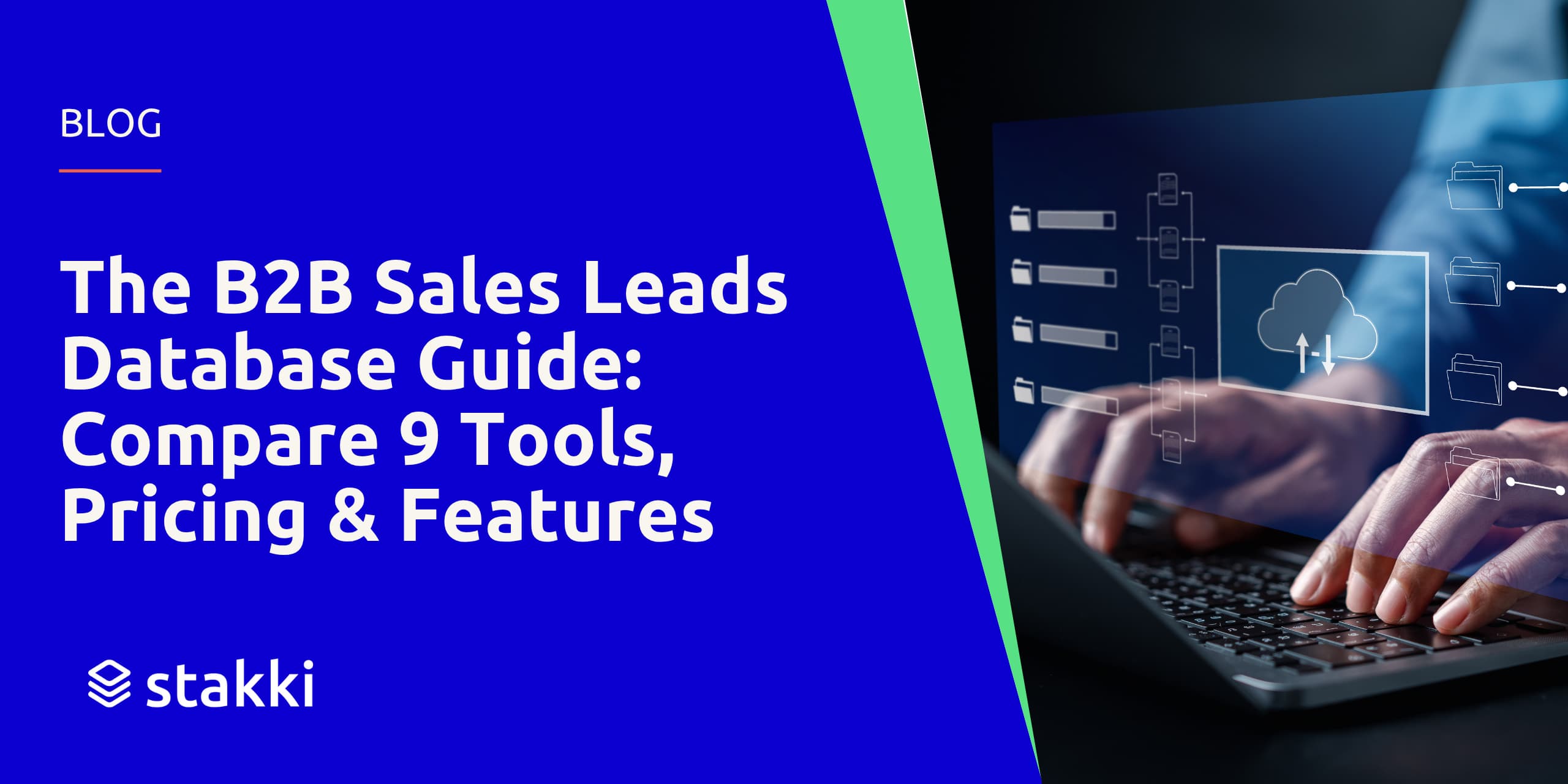What Are B2B Contact Database Platforms?
B2B contact database platforms are software tools that help sales teams find accurate, actionable contact information to fuel outbound outreach. These platforms provide key data such as:
- Names and job titles
- Emails and direct dials
- LinkedIn profiles
- Firmographic and technographic data
They act as the backbone of most sales development workflows, allowing reps to identify, prioritize, and reach out to their ideal buyers faster and with more precision.
Why a Good B2B Contact Database Platform Is Important
The data you use is the foundation of your outbound success. If you're using stale, inaccurate, or generic data, you're setting your team up for missed connections, wasted dials, and confused prospects. The best data platforms help:
- Improve connect rates
- Support account-based workflows
- Enable personalization
- Eliminate manual research
- Drive higher quality pipeline
In a world where time-to-pipeline matters, great data is a force multiplier for your sales team.
Key Differences to Evaluate for B2B Contact Data Providers
1. Data Accuracy and Refresh Rate
Questions you need to be asking: How fresh is the data? How often is it validated? What’s the bounce rate on emails? What percentage of contacts have valid mobile numbers?
Look for platforms that:
- Share refresh cadences openly
- Offer verified phone and email data
- Provide intent or behavioral triggers
2. Integration With CRM and Workflows
B2B data is only valuable if it reaches your CRM and reps seamlessly.
Ensure your data tool integrates with:
3. Available Segmentation Filters
Good filters allow you to narrow down ideal buyers by:
- Job title, seniority, industry
- Tech used, hiring patterns, recent news
- Buyer intent, firmographics, region
4. Customer Support and Data Customization
Can they pull niche lists on request? How do they handle tickets or bounce disputes? Do they proactively improve your setup?
High-quality support can often 10x the ROI of your tool.
5. Additional Key Considerations
- Pricing model: Credit vs. license-based. Credit models like Upcell are more flexible for growing teams.
- Compliance: Is the provider GDPR/CCPA compliant?
- Regional focus: Some tools dominate in the US; others specialize in EMEA or LATAM.
Top 15 B2B Data Providers Compared
Pros: Strong in EMEA, GDPR-compliant, great mobile coverage
Cons: Expensive for startups, license-based pricing
Best for: Enterprise teams needing EMEA compliance
Pros: Fast to use, wide coverage, Chrome extension
Cons: US focused, inconsistent accuracy in EMEAin some countries
Best for: SMB US-based teams
Pros: Slick Chrome extension, pricing, high coverage, live enrichment, supports automation
Cons: Less known brand, mobile heavy focus
Best for: Teams needing global reach + flexible spend and phone first teams
Pros: Huge US database, intent layers, integrations
Cons: Very expensive, contract heavy
Best for: Large orgs needing scale and intent
Pros: Low-cost, broad data, easy onboarding
Cons: Limited EMEA accuracy, some spam reports
Best for: Solo reps, bootstrapped startups, volume approaches
Pros: Good global data, waterfall enrichment
Cons: Basic UI, Hubspot and Clay integration
Best for: Mid-size teams with other primary options
Pros: Aggressive enrichment, unlimited plans
Cons: Hit-or-miss accuracy, upsell-heavy
Best for: Call-heavy teams on a budget
Uplead
Pros: Simple UI, niche industry coverage
Cons: Slower enrichment, limited automation
Best for: Teams targeting niche verticals
Pros: Orchestration over data; blends multiple sources
Cons: Requires technical setup
Best for: Ops-heavy teams wanting full automation
Pros: Strong EMEA coverage, great mobile match rate
Cons: Limited US data
Best for: SDR teams prospecting in Europe
Pros: Native Salesforce plugin, real-time enrichment
Cons: Salesforce only, newer platform
Best for: Salesforce-based outbound teams
Pros: Waterfall enrichment, API-based
Cons: Hubspot and Clay integration only
Best for: Teams managing high data volume
RocketReach
Pros: Quick email lookups, wide reach
Cons: No CRM sync
Best for: Researchers and non-sales teams
Clearbit
Pros: Firmographic & technographic data
Cons: Less contact-level info
Best for: Marketing enrichment
Dealfront
Pros: Strong GDPR compliance, excellent for DACH region
Cons: Less visibility outside Europe
Best for: EMEA-focused sales orgs
The Stakki Take: The Best B2B Data Provider for Outbound Sales
Our top pick is the one that supports the way you work. From working with hundreds of teams across Stakki, we’ve found most success comes from:
- Using 2–3 data sources, not just one
- Pairing credit-based enrichment (like Clay) with CRM-first tools (like Upcell)
- Avoiding bloated contracts until your process is proven
FAQ
What is B2B data?
B2B data refers to business-related contact and firmographic information used in sales and marketing outreach.
What Is a B2B Data Provider?
A platform that helps you find email addresses, phone numbers, and company info for outbound prospecting.
How to Test and Compare Providers Before You Buy?
Start with a small pilot or free trial. Test match rates, bounce rates, CRM sync, and rep usage.
How do I find B2B contacts?
Use a combination of LinkedIn, email lookup tools, CRM enrichers, and databases.
Which are best for global or niche targeting?
Try Upcell, Salesbot, Clay, BetterContact or FullEnrich for more niche or international targeting.
How do credit-based enrichment models work?
You only pay when you enrich a contact. Better for lean or fast-scaling teams.
Are B2B databases GDPR compliant?
Some are, some aren't. Cognism and Dealfront are known for compliance-first approaches.
Can I use multiple data providers together?
Yes, and you probably should. Waterfall enrichment is common among high-performance teams.











